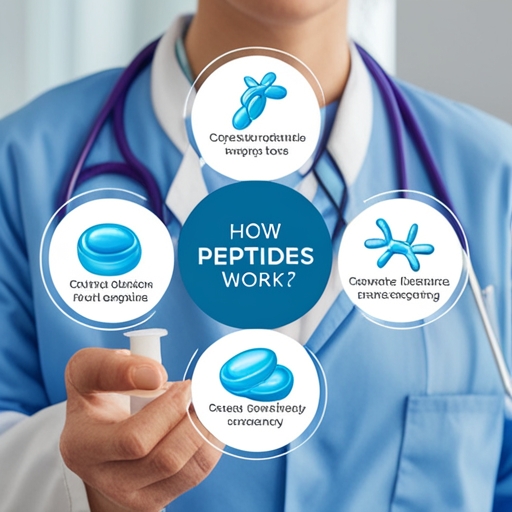How Peptides Work – Unlocking the Secrets of Cellular Communication

Peptides are fascinating molecules that play crucial roles in our bodies and have numerous applications in medicine, skincare, and nutrition. These short chains of amino acids are the building blocks of life, involved in everything from cellular communication to immune system regulation.
What Are Peptides?
Peptides are short sequences of amino acids linked by peptide bonds. Unlike proteins, which can contain hundreds or thousands of amino acids, peptides typically consist of 2 to 50 amino acids. This smaller size allows them to perform specific functions in the body with great precision.
Naturally occurring peptides are found throughout our bodies, while synthetic peptides are produced in laboratories for various applications. These versatile molecules act as signaling molecules, hormones, and enzymes, playing vital roles in maintaining our health and well-being.
How Do Peptides Facilitate Cellular Communication?
Peptides are essential for cellular communication, acting as messengers that relay information between cells. They bind to specific receptors on cell surfaces, triggering cascades of reactions within the cell. This process is crucial for:
- Maintaining homeostasis
- Coordinating physiological functions
- Regulating cell growth and differentiation
- Modulating immune responses
By facilitating this intricate cellular communication network, peptides help orchestrate the complex symphony of biological processes that keep our bodies functioning optimally.
The Role of Peptides in the Human Body
Peptides are involved in numerous physiological functions, making them indispensable for our health. Some key roles include:
1. Hormonal regulation
2. Neurotransmission
3. Growth factor signaling
4. Immune system modulation
5. Wound healing
6. Metabolism and energy balance
These diverse functions highlight the importance of peptides in maintaining overall health and well-being. Bioactive peptides are particularly interesting, as they have specific physiological effects beyond their nutritional value.
Types of Peptides and Their Functions
There are various types of peptides, each with unique functions:
Signaling peptides: These regulate cellular communication and immune responses.
Antimicrobial peptides: They protect against infections by killing bacteria, viruses, and fungi.
Hormon

e peptides: Examples include insulin and growth hormone, which regulate metabolic processes and growth.
Neuropeptides: These act as neurotransmitters or neuromodulators in the nervous system.
Understanding these different types of peptides is crucial for peptide manufacturers and researchers developing new therapies and applications.
Peptide Synthesis and Production
Peptide synthesis involves the chemical assembly of amino acids to create specific peptide sequences. This process can be carried out using solid-phase or liquid-phase techniques, with solid-phase peptide synthesis being the most common method.
Peptide manufacturers must adhere to strict quality control measures to ensure the purity and efficacy of their products. This includes:
– Peptide purity tests
– Peptide batch testing
– Peptide analysis
These quality control measures are essential for maintaining peptide safety and efficacy, particularly for peptides used in medical treatments or research.
Peptides vs. Proteins: Key Differences
While both peptides and proteins are composed of amino acids, there are several key differences:
| Characteristic | Peptides | Proteins |
|---|---|---|
| Size | 2-50 amino acids | 50+ amino acids |
| Structure | Simpler, often linear | More complex, often folded |
| Function | Signaling, hormonal | Structural, enzymatic |
| Stability | Generally less stable | More stable |
These differences in size and complexity contribute to the unique roles that peptides and proteins play in biological processes.
How Peptides Influence Hormonal Activity
Peptides play a crucial role in hormonal activity, either acting as hormones themselves or influencing the release and action of other hormones. Hormone peptides, such as insulin and growth hormone, regulate various metabolic processes by binding to specific receptors on target cells.
Some peptides, like those produced by the hypothalamus, modulate the release of other hormones from the pituitary gland. This intricate interplay of peptides and hormones is essential for maintaining hormonal balance and overall health.
Peptides in Medical Treatments
The use of peptides in medical treatments has grown significantly in recent years. Peptide clinics and researchers are exploring various applications, including:
– Treatment of diabetes with insulin analogs
– Cancer therapies using targeted peptides
– Management of autoimmune diseases
– Vaccines and diagnostic tests
Peptide-based drugs offer advantages such as high specificity and low toxicity, making them a promising area of medical research. As peptide sciences advance, we can expect to see more innovative peptide-based therapies in the future.
Peptides and Immune System Modulation
Peptides play a crucial role in modulating the immune system. They can:
– Act as signaling molecules, influencing immune responses
– Possess antimicrobial properties, protecting against infections
– Regulate inflammation and immune cell activity
– Participate in antigen presentation and cytokine production
These immune-modulating properties make peptides valuable tools in developing new therapies for autoimmune disorders and improving overall immune function.
Peptides in Skincare and Anti-Aging
The skincare industry has embraced peptides for their anti-aging and skin-enhancing properties. Popular peptides in skincare include:
– Collagen peptides
– Elastin peptides
– Copper peptides
These peptides can promote skin elasticity, reduce wrinkles, and improve overall skin texture. Many online peptide stores offer a range of peptide-based skincare products, catering to the growing demand for effective anti-aging solutions.
Potential Side Effects of Peptide Use
While peptides offer numerous benefits, it's important to be aware of potential side effects. These may include:
– Allergic reactions
– Injection site reactions
– Gastrointestinal issues
The risk of side effects depends on the type of peptide, dosage, and individual factors. It's crucial to use peptides under medical supervision and to source them from reputable peptide suppliers who prioritize peptide safety and quality.
Peptides in Muscle Growth and Repair
Peptides have gained popularity in the fitness and bodybuilding communities for their potential to enhance muscle growth and repair. Some peptides, such as growth hormone-releasing peptides (GHRPs), can stimulate protein synthesis and muscle cell proliferation.
Benefits of using peptides for muscle growth include:
– Increased muscle mass and strength
– Reduced muscle inflammation
– Enhanced recovery after intense workouts
However, it's important to note that the use of performance-enhancing peptides may be regulated or banned in certain sports competitions.
How to Incorporate Peptides into Your Diet
While many people focus on synthetic peptides, it's possible to incorporate peptides into your diet through natural sources. Foods rich in peptides include:
– Meat and fish
– Dairy products
– Eggs
– Legumes and soy
Additionally, peptide powders and supplements are available for those looking to increase their peptide intake. When choosing supplements, it's important to consider factors such as peptide purity and peptide authentication to ensure you're getting a high-quality product.
Peptide Research and Future Applications
The field of peptide research is rapidly evolving, with new applications and discoveries emerging regularly. Future applications of peptides may include:
– Personalized medicine
– Targeted cancer therapies
– Novel antimicrobial treatments
– Regenerative medicine
As peptide synthesis techniques improve and our understanding of peptide biology deepens, we can expect to see even more innovative uses for these versatile molecules.
Common Myths and Misconceptions About Peptides
There are several myths and misconceptions surrounding peptides that need to be addressed:
Myth 1: All peptides are safe and effective.
Reality: The safety and efficacy of peptides depend on their type, dosage, and individual factors. Always consult a healthcare professional before using peptides.
Myth 2: Peptides are the same as steroids.
Reality: Peptides and steroids are distinct substances with different structures and functions. While some peptides may have anabolic effects, they are not steroids.
Myth 3: Peptides are only used for bodybuilding.
Reality: While peptides are popular in bodybuilding, they have numerous applications in medicine, skincare, and general health.
Conclusion
Peptides are remarkable molecules that play crucial roles in our bodies and offer exciting possibilities in medicine, skincare, and nutrition. As research continues to uncover new applications for peptides, it's important to approach their use with caution and respect for their potent biological effects.
Whether you're considering peptides for medical treatment, skincare, or athletic performance, it's essential to consult with healthcare professionals and source products from reputable peptide suppliers. By understanding the science behind peptides and staying informed about current research, we can harness the power of these fascinating molecules to improve our health and well-being.
Frequently Asked Questions
Are peptides legal to purchase and use?
The legality of peptides varies depending on the specific peptide and its intended use. Many peptides are legal for research purposes, while others are approved for medical use. Always check local regulations and consult a healthcare professional.
How long do peptides last once reconstituted?
Peptide shelf life after reconstitution varies, but most peptides remain stable for 1-2 weeks when stored properly in the refrigerator. Proper peptide storage and handling are crucial for maintaining potency.
Can I mix different peptides together?
While some peptides can be combined, it's essential to consult with a healthcare professional or refer to scientific literature before mixing peptides. Certain combinations may interact or interfere with each other's effects.
